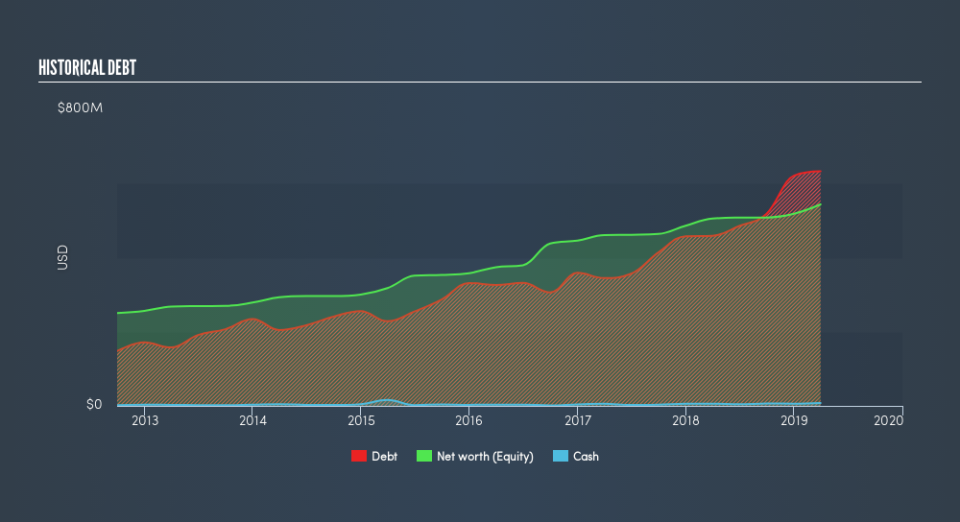We Think Chesapeake Utilities (NYSE:CPK) Is Taking Some Risk With Its Debt

Legendary fund manager Li Lu (who Charlie Munger backed) once said, 'The biggest investment risk is not the volatility of prices, but whether you will suffer a permanent loss of capital.' When we think about how risky a company is, we always like to look at its use of debt, since debt overload can lead to ruin. We note that Chesapeake Utilities Corporation (NYSE:CPK) does have debt on its balance sheet. But the more important question is: how much risk is that debt creating?
When Is Debt A Problem?
Debt is a tool to help businesses grow, but if a business is incapable of paying off its lenders, then it exists at their mercy. Part and parcel of capitalism is the process of 'creative destruction' where failed businesses are mercilessly liquidated by their bankers. However, a more frequent (but still costly) occurrence is where a company must issue shares at bargain-basement prices, permanently diluting shareholders, just to shore up its balance sheet. Of course, debt can be an important tool in businesses, particularly capital heavy businesses. When we think about a company's use of debt, we first look at cash and debt together.
See our latest analysis for Chesapeake Utilities
What Is Chesapeake Utilities's Net Debt?
The image below, which you can click on for greater detail, shows that at March 2019 Chesapeake Utilities had debt of US$633.9m, up from US$460.5m in one year. And it doesn't have much cash, so its net debt is about the same.
How Strong Is Chesapeake Utilities's Balance Sheet?
The latest balance sheet data shows that Chesapeake Utilities had liabilities of US$508.6m due within a year, and liabilities of US$630.6m falling due after that. Offsetting this, it had US$7.98m in cash and US$103.9m in receivables that were due within 12 months. So its liabilities total US$1.03b more than the combination of its cash and short-term receivables.
This is a mountain of leverage relative to its market capitalization of US$1.52b. Should its lenders demand that it shore up the balance sheet, shareholders would likely face severe dilution.
In order to size up a company's debt relative to its earnings, we calculate its net debt divided by its earnings before interest, tax, depreciation, and amortization (EBITDA) and its earnings before interest and tax (EBIT) divided by its interest expense (its interest cover). The advantage of this approach is that we take into account both the absolute quantum of debt (with net debt to EBITDA) and the actual interest expenses associated with that debt (with its interest cover ratio).
Chesapeake Utilities has a debt to EBITDA ratio of 4.2 and its EBIT covered its interest expense 5.3 times. Taken together this implies that, while we wouldn't want to see debt levels rise, we think it can handle its current leverage. Chesapeake Utilities grew its EBIT by 5.6% in the last year. Whilst that hardly knocks our socks off it is a positive when it comes to debt. There's no doubt that we learn most about debt from the balance sheet. But it is future earnings, more than anything, that will determine Chesapeake Utilities's ability to maintain a healthy balance sheet going forward. So if you want to see what the professionals think, you might find this free report on analyst profit forecasts to be interesting.
But our final consideration is also important, because a company cannot pay debt with paper profits; it needs cold hard cash. So the logical step is to look at the proportion of that EBIT that is matched by actual free cash flow. Over the last three years, Chesapeake Utilities saw substantial negative free cash flow, in total. While investors are no doubt expecting a reversal of that situation in due course, it clearly does mean its use of debt is more risky.
Our View
We'd go so far as to say Chesapeake Utilities's conversion of EBIT to free cash flow was disappointing. Having said that, its ability to grow its EBIT isn't such a worry. It's also worth noting that Chesapeake Utilities is in the Gas Utilities industry, which is often considered to be quite defensive. Once we consider all the factors above, together, it seems to us that Chesapeake Utilities's debt is making it a bit risky. That's not necessarily a bad thing, but we'd generally feel more comfortable with less leverage. Over time, share prices tend to follow earnings per share, so if you're interested in Chesapeake Utilities, you may well want to click here to check an interactive graph of its earnings per share history.
Of course, if you're the type of investor who prefers buying stocks without the burden of debt, then don't hesitate to discover our exclusive list of net cash growth stocks, today.
We aim to bring you long-term focused research analysis driven by fundamental data. Note that our analysis may not factor in the latest price-sensitive company announcements or qualitative material.
If you spot an error that warrants correction, please contact the editor at editorial-team@simplywallst.com. This article by Simply Wall St is general in nature. It does not constitute a recommendation to buy or sell any stock, and does not take account of your objectives, or your financial situation. Simply Wall St has no position in the stocks mentioned. Thank you for reading.

